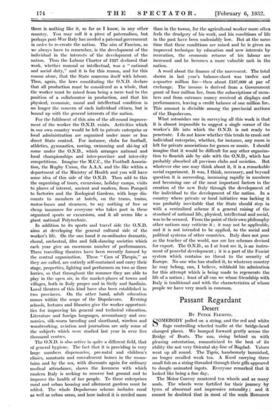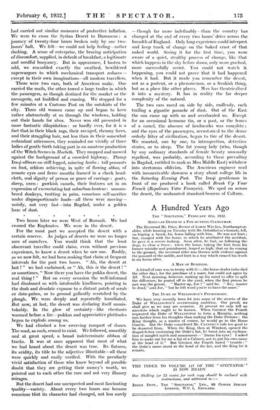Passant Regardant
Desert
BY PETER FLEMING.
SOMEBODY pulled on a string, and the red and white flags controlling wheeled traffic at the bridge-head changed places. We bumped forward gently across the Bridge of Boats. The sun, rising behind us with pleasing ostentation, romanticized to the best of its ability the not very Oriental sky-line of Bagdad. Values went up all round. The Tigris, handsomely burnished, no longer recalled weak tea. A Kurd carrying three small fish on a string threaded through their gills appeared to dangle animated ingots. Everyone remarked that it looked like being a fine day.
The Motor Convoy mustered ten wheels and as many souls. The wheels were fortified for their journey by tyres of abnormal end impressive rotundity ; and it cannot be doubted that in. most of the souls Romance had carried out similar measures of protective inflation. We were to cross the Syrian .Desert to Damascus : a journey of twenty-four hours broken only by one two- hcairs'. halt. We felt—we could not help feeling— rather dashing. A sense of enterprise, the bracing anticipation of discomfort, supplied, in default of breakfast, a legitimate and needful buoyancy. But in appearance, I hasten to add, we resembled exactly the swathed, bewildered supercargoes to which mechanical transport reduces— except in their own imaginations—all modern traVellers. , There were two cars, both of American make. One carried the mails, the other towed a large trailer in which the passengers, as though destined for the market or the menagerie, sat huddled and craning. We stopped for a few .minutes at a Customs Post on the outskirts of the city: Three old women came up and began to keen rather abstractedly at us through the windows, holding out their hands for alms. Never was eld presented in more fantastic dilapidation : or hardly ever, for it is a fact that in their black rags, their ravaged, rheumy faces, and their straggling hair, not less than in their somewhat redundant utterances, they reminded me vividly of three ladies of gentle birth taking part in an amateur production of the Witch Scenes in Macbeth. They mopped and mowed against the background of a crowded highway. Plump Iraqi officera on Stift-legged, mincing Arabs : tall peasants On foot, seldom achieving, in spite of flowing abbas, of remote eyes and fierce mouths framed in a check head- cloth, real dignity of person or grace of carriage : goats, sheep, oxen: gawkish camels, their features set in an expression of excruciating but suburban hauteur: unnum- bered donkeys, trotting in prim, conscious self-sacrifice under disproportionate loads—all these were moving— noisily, not very fast—into Bagdad, under a golden 'haze of dust.
• • • • Two hours later we were West of Ramadi. We had crossed the Euphrates. We were in the desert.
For the most part we accepted the desert with a certain reserve. As judges of deserts we were no longer sure of ourselves. You would think that the least observant traveller could claim, even without previous ,experience, to know a desert when he saw one. Rashly, as we now felt, we had been making that claim at frequent intervals for the past two hours. "Aim, the desert at last ! " we had exclaimed, or " Ah, this is the desert ! " or sometimes," Now there you have the pukka desert, the real thing " But on every occasion the well-informed had disabused us with intolerable kindliness, pointing in the drab and desolate expanse to a distant patch of scrub • or date-palms, or to ground gallantly scratched by the plough. We were deeply and repeatedly humiliated. But now, at last,. the desert. was declaring itself unmis- takably. In the glow of certainty—like chestnuts warmed before a fire—pukkas and appreciative platitudes began to explode among us..
We had climbed a low swerving rampart of dunes. The road, as such, ceased to exist. We followed, smoothly and at great speed,- a broad indeterminate ribbon of tracks. It was at once apparent that most of what we had heard about the desert was true. Its flatness, its aridity, its title to the adjective illimitable—all these were quickly and easily verified. With the peculiarly vivid satisfaction of those who know beyond all possible doubt that they are getting their money's worth, we pointed out to each other the - rare and not very illusory mirages.
But the desert had one unexpected and most fascinating quality—variety. About every two hours one became conscious that its character had changed, not less surely
—though far more indefinably—than the country has changed at the end of every two hours' drive across the breadth of England. Only long experience could interpret and keep track of change on the baked crust of that naked world. Seeing it for the first time, you were aware of a quiet, stealthy process of change, like that which happens in the sky before dawn, only more gradual, more successfully secret. You could not watch it happening, you could not prove that it had happened when it had. But it made you remember the desert, not as a portent, or a phenomenon, or a freakish thing, but as a place like other places. Man has theatricalized it into a mystery. It has in reality the far deeper complexity of the natural.
The two cars raced on side by side, endlessly, each trailing a gigantic panache of dust. Out of the East the sun came up with us and overhauled us. Except for an occasional kerosene tin, or a post, or the bones of a camel, the absence of landmarks was complete ; and the eyes of the passengers, accustomed to the dense orderly litter of civilization, began to tire of the desert. We resorted, one by one, to introspection, detective stories, or to sleep. The fat young lady (who, though by any ordinary standards of female beauty unusually repellent, was probably, according to those prevailing in Bagdad, entitled to rank as Miss Middle East) withdrew into stertorous oblivion. The American engineer read with inconceivable slowness a story about college life in the Saturday Evening Post. The Iraqi gentleman in front of me produced a book called Brush Up Your French (Repolissez Votre Francais). We sped on across the desert, the undaunted standard-bearers of Culture.









































 Previous page
Previous page